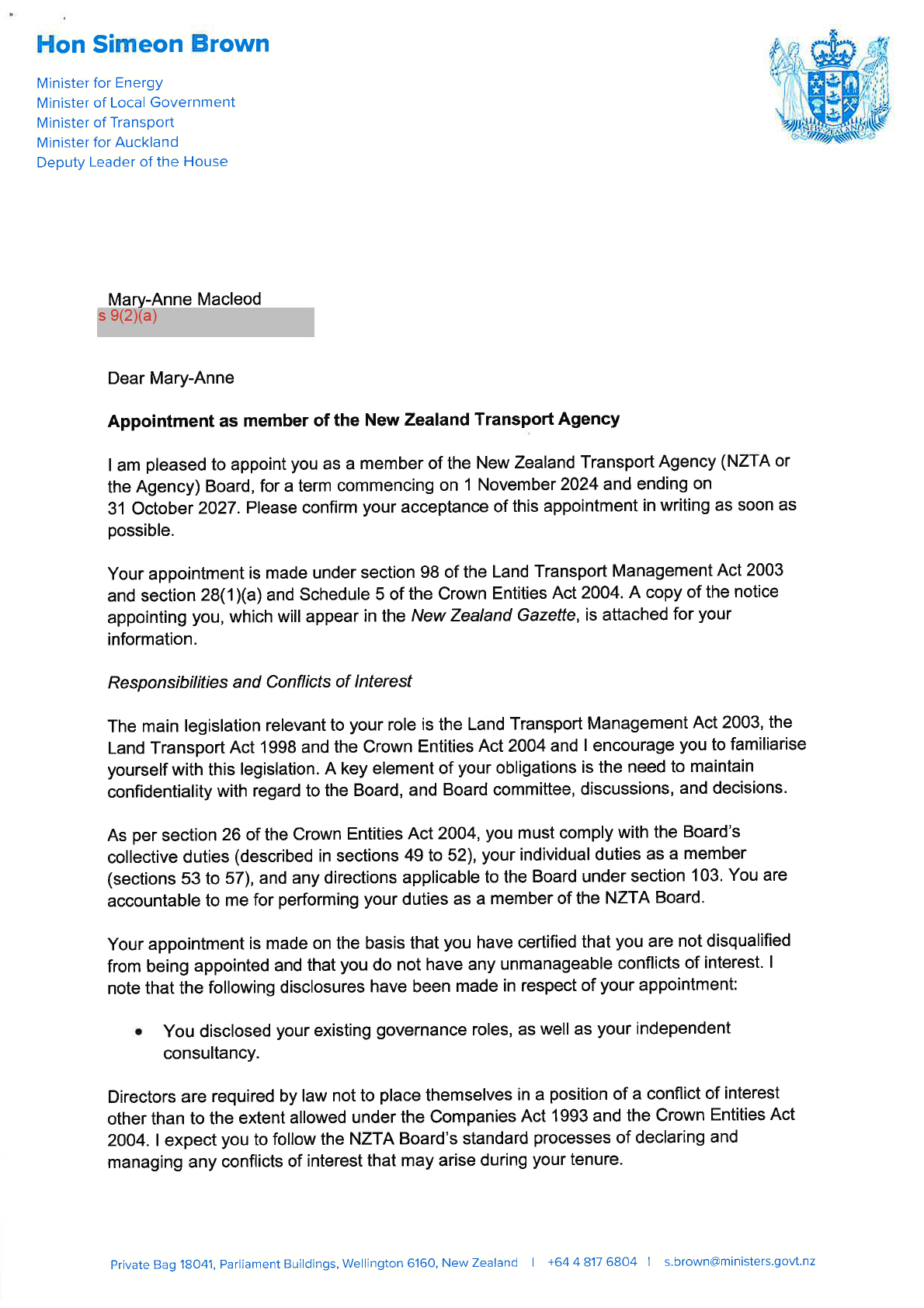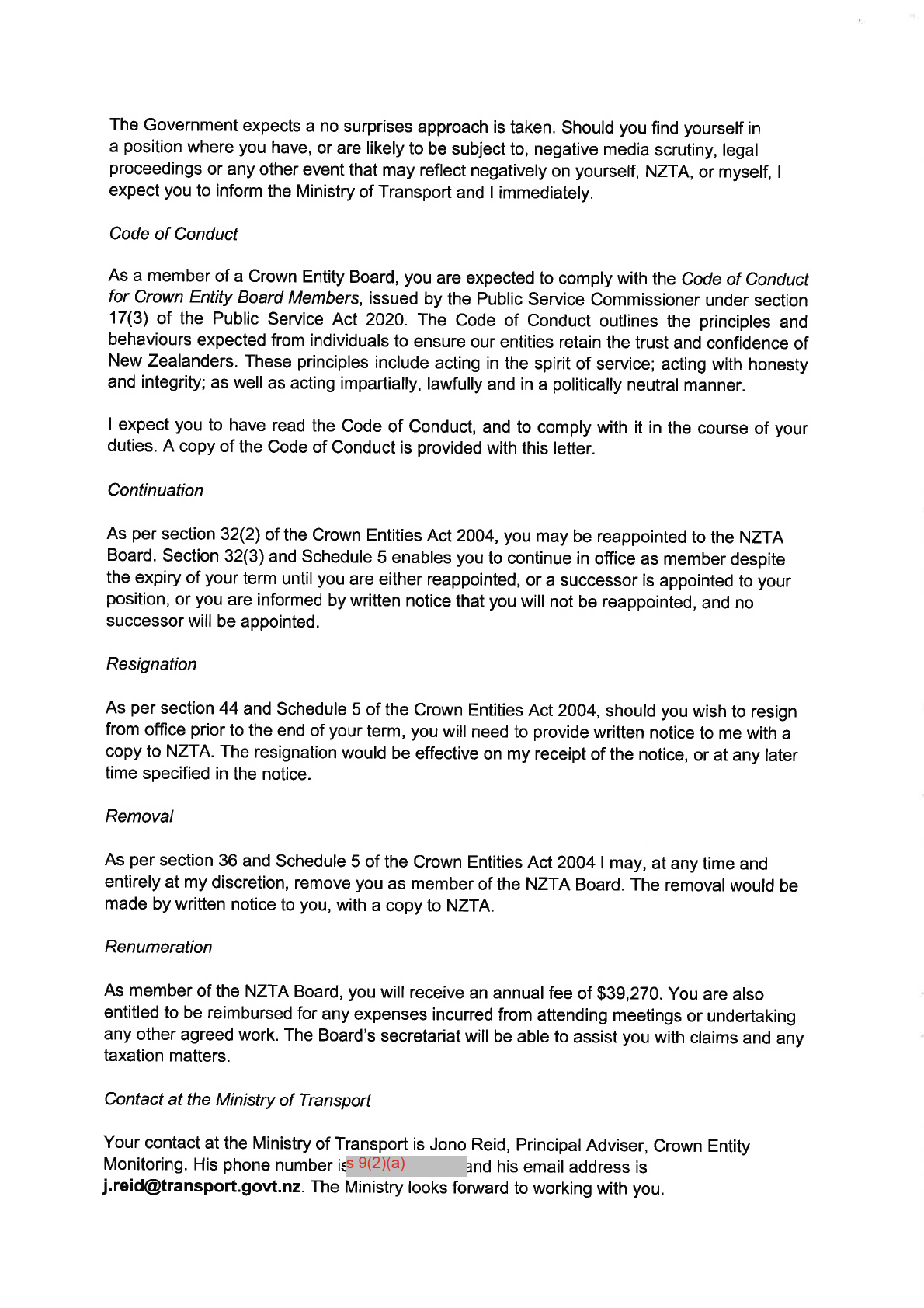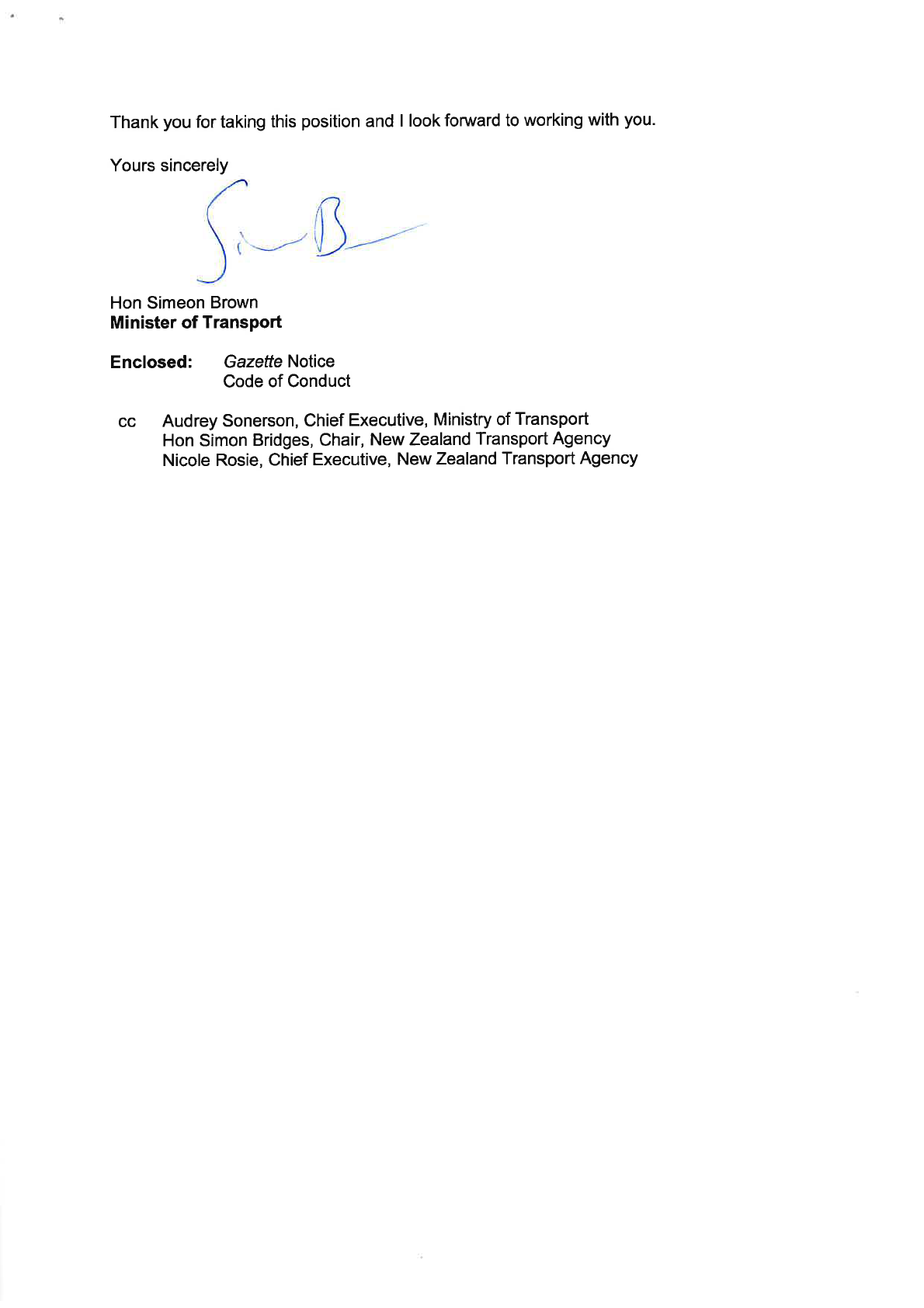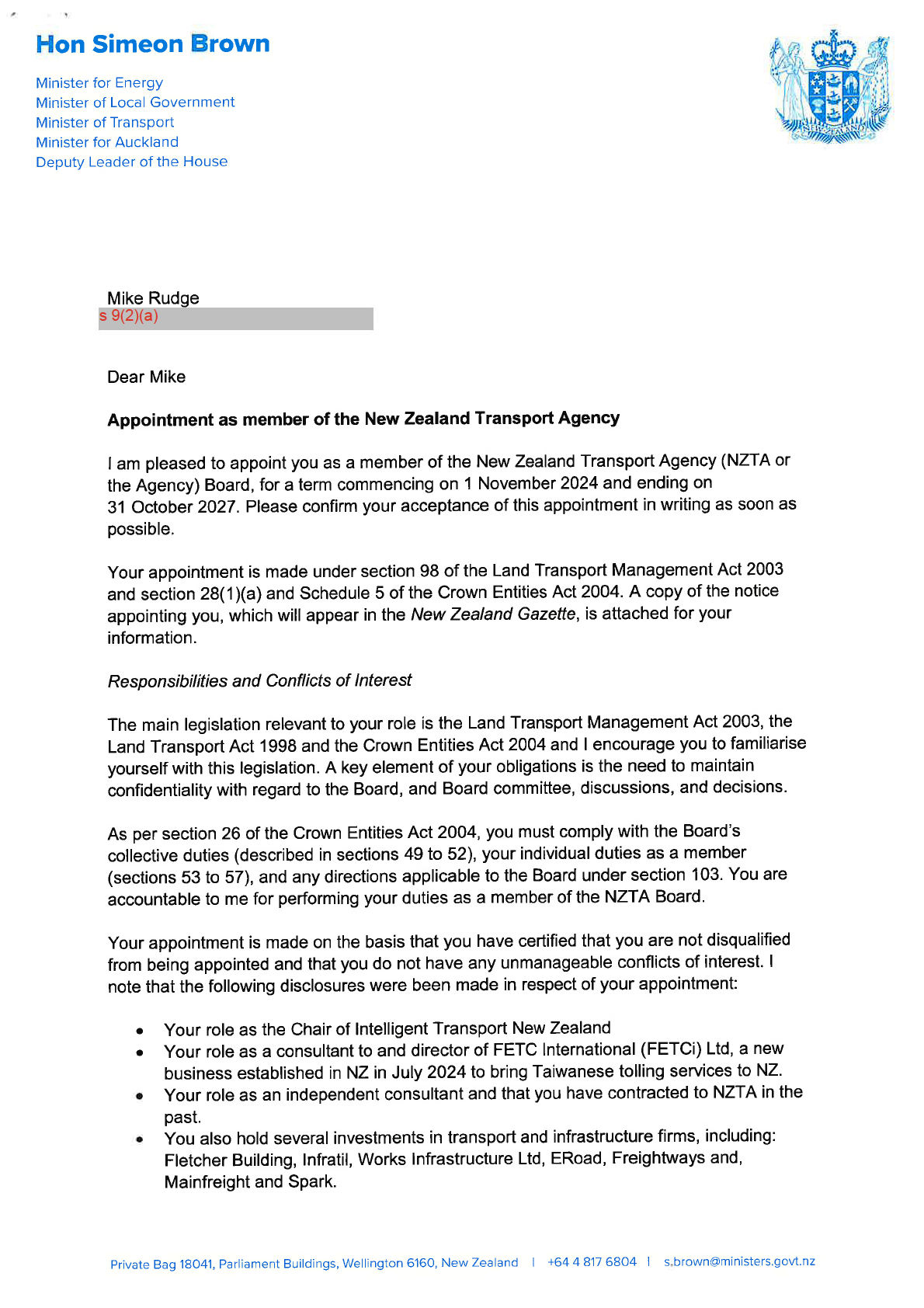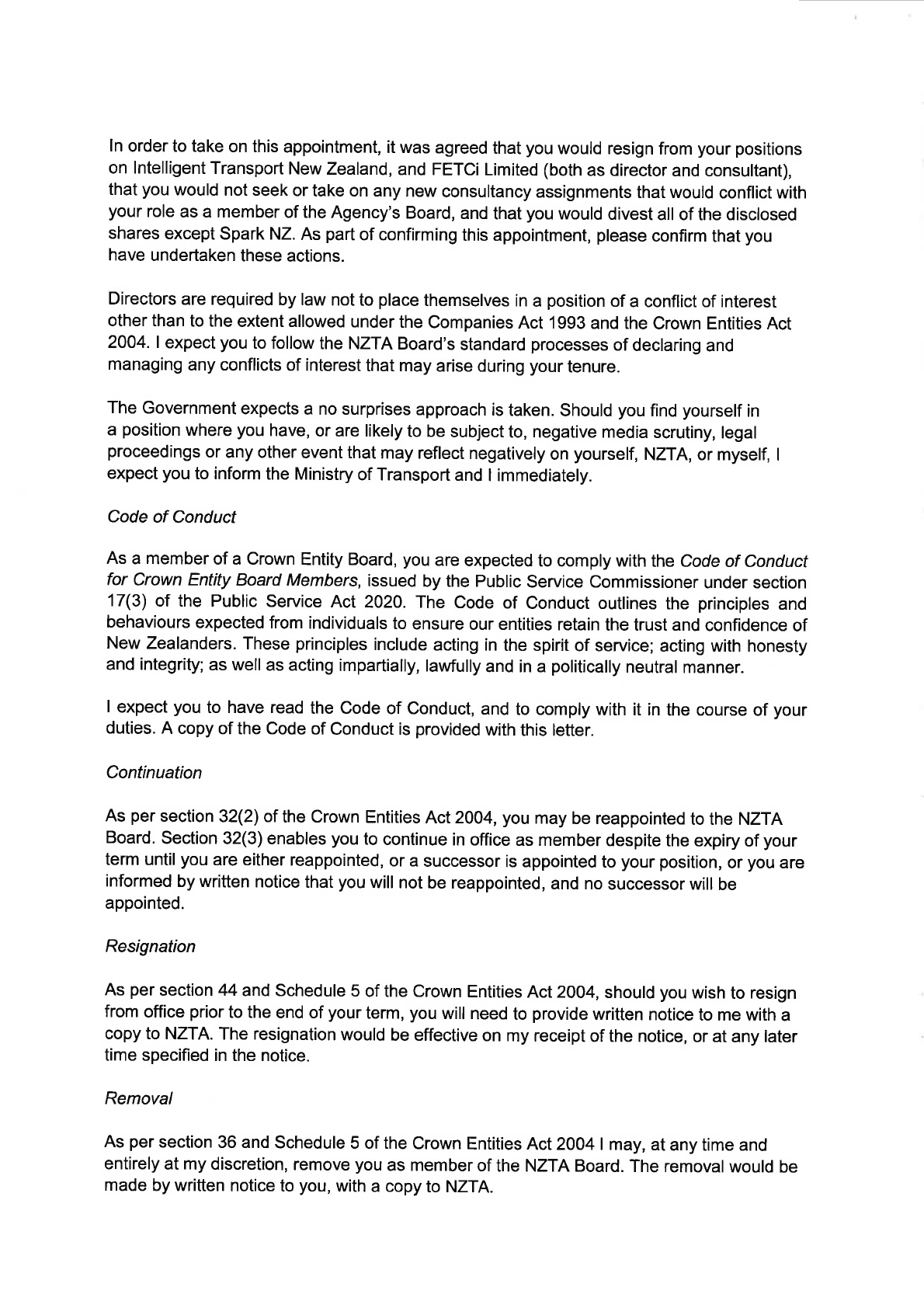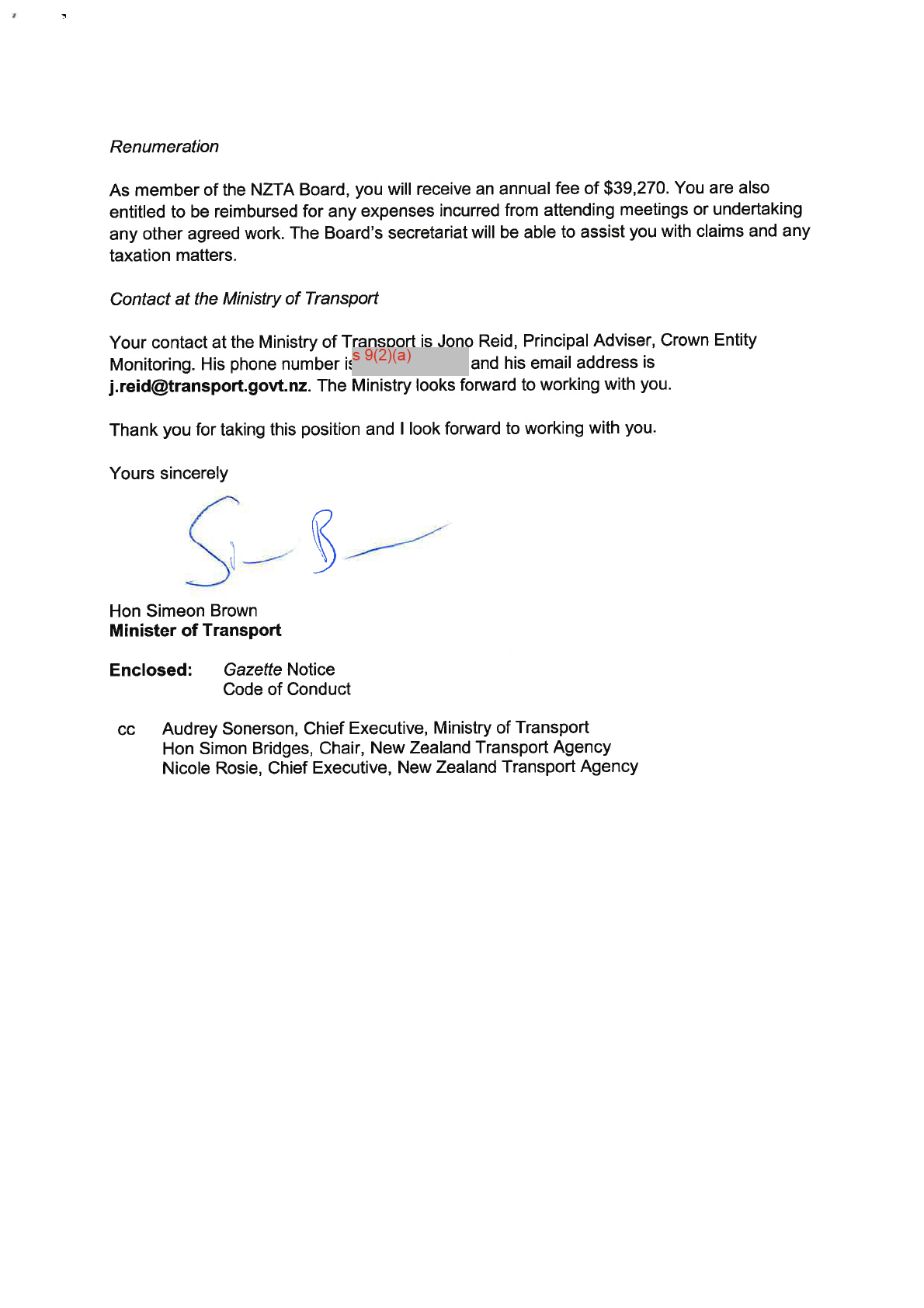
Position Description| Members – New Zealand Transport
Agency
On behalf of the Minister of Transport, the Ministry of Transport is searching for three high-calibre
candidates to serve as members of the New Zealand Transport Agency (NZTA).
NZTA is a Crown agent under the Crown Entities Act 2004, with responsibility for financial
investments in, and the management and regulation of, the land transport system. It is governed by
a Board of seven to nine members who are appointed by the Minister of Transport under the Land
Transport Management Act 2003.
Competencies sought
The Board requires a full range of competencies across members to be effective. To be
considered, candidates must be an experienced Board member or executive and possess
competencies which complement those of existing Board members. They must bring an
understanding of the complexity of operating within a modern transport system.
For these roles, the Minister is looking for individuals who can of er one or more of the following
competencies to the Board:
•
investment and revenue – deep understanding of funding and financing mechanisms,
particularly the use of investment funding models, innovative funding and financing, and debt
management to achieve a desired outcome. Experience working in or with international
markets, or in the financing of major projects is desirable.
•
engineering, construction, planning and delivery – experience in overseeing and
delivering major infrastructure projects particularly as a lead contractor or part of an
alliance/public private partnership model. The successful candidate must be able to
demonstrate knowledge of the lifecycles of large infrastructure assets, their resilience and
security, and their ability to respond to population needs over time. A qualification and
experience in engineering or a related discipline is desirable, as is experience in transport
engineering
•
an understanding of the workings of Central and Local Government – including how
decisions are made, the context in which decisions are made, and the importance of these
relationships for delivery of NZTA’s functions.
•
people, culture, and leadership capability – experience in building or overseeing the
development of highly engaged and capable workforces, alongside shaping a high-
performance organisational culture
•
procurement – experience of contract management of large-scale construction contracts
•
digital enablement and transformational change – knowledge of digital systems and
experience in utilising smart investments to drive organisational efficiencies.
•
an understanding of the role The Treaty of Waitangi plays in the transport sector
•
an awareness of how organisations should perform effectively and prudently within a
given cost envelope
•
strategy and culture – contribute to and drive strategy formulation, direction, implementation
and communication and ensure development of organisational culture based on the vision
and strategy
•
judgement and critical thinking – demonstrated experience of exercising judgement and
critical thinking, preferably within a regulatory environment. In addition, you should be an
active listener, open thinker, and be able to draw from your own personal experiences to
contribute towards discussions at the Board table
•
able to work collaboratively to reach consensus – demonstrated understanding of the
individual and collective duties Boards possess (particularly within a Crown context), and an
ability to reach a collective decision as a Board while respectively and constructively
evaluating each other’s personal views on a matter. Accepts the need for collective
responsibility for the final decision reached.
In addition, the Minister of Transport expects the Board collectively to possess the following
competencies. Candidates wil be expected to demonstrate experience or understanding in one or
more of these competencies:
•
governance and strategy – experience in governance, preferably in both the public and
private sectors, with the ability to ask the right questions of management, distinguish
between governance and management, and understand and perform governance functions.
The successful candidate wil be able to engage with a range of stakeholders, deliver on
Government policy and direction and a have a clear understanding of the role of a governor.
•
the ability to navigate complex operating environments to deliver results – this includes
being able to manage competing and/or chal enging priorities, as wel as political and public
policy factors.
•
regulation – a strong understanding of regulatory functions and powers including senior
experience in either a regulated industry or as a regulator. A deep understanding of the
fundamentals of a modern regulator and the impact of regulation is required.
•
accounting (audit, risk and assurance) – qualified accountant with proven audit, risk and
assurance experience, including having chaired an audit commit ee. Must have experience
overseeing or delivering risk management and assurance functions within large organisations.
•
resource management and consenting – understanding of integrated land use planning
and infrastructure development, including taking a systems perspective to integrating the built
environment within the transport system.
•
stakeholder engagement, including iwi – experience engaging with a large number of
diverse stakeholders including fellow directors, management, key individuals, local
government, transport sector and iwi in order to establish and maintain effective
relationships.
•
knowledge of transport safety – including actions underway towards achieving a zero-harm
environment on New Zealand’s roads, and the dif erent levels of behavioural interventions to
achieve safer practices across land transport modes.
•
health, safety and legal obligations – an understanding of al the legislative requirements of
directors and entities, in particular the Health and Safety at Work Act 2015 and ideal y
experience in embedding a health and safety culture within a complex organisation.
•
digitally competent (IT change programmes) – knowledge of digital systems and
experience in overseeing IT change management, assurance of change programmes.
Background to NZTA
NZTA’s core functions (fully listed under section 95 of the Land Transport Management Act 2003)
are:
•
planning the land transport networks: influencing transport planning and partnering with
approved organisations to invest in the transport system for desired results
•
investing in land transport: partnering with approved organisations to invest in the land
transport system for desired outcomes
•
managing the State highway network: developing and managing the State highway
network
•
regulation: implementing the land transport regulatory framework to ensure safe access and
the use of the land transport system
•
investigate and review accidents and incidents involving transport on land in its
capacity as the responsible safety authority, subject to any limitations set out in the Transport
Accident Investigation Commission Act 1990
•
assist, advise, and co-operate with KiwiRail in relation to KiwiRail’s role in preparing each
rail network investment programme.
The Land Transport Management Act 2003 further outlines NZTA’s statutorily independent
functions, which are to:
•
develop and approve the National Land Transport Programme (NLTP) to give effect to the
direction and priorities in the GPS
•
approve activities as qualifying for payment from the National Land Transport Fund (NLTF)
•
approve procurement procedures for land transport activities
•
issue or suspend any land or rail transport document or authorisation
•
enforce any provisions relating to its functions.
Background to the role
The Board has the following responsibilities:
•
setting the strategic direction for NZTA to ensure that it has the right capability to effectively
deliver its core roles and functions
•
appointing the Chief Executive and holding management to account for the delivery of
Government priorities and the organisation’s core functions
•
providing oversight of NZTA’s operational activities to support the efficient operation of the
land transport system, including management and maintenance of the State highway
network
•
providing oversight and management of the land transport investment system, including
providing stewardship and oversight of the NLTF
•
developing the NLTP to give effect to the Government’s transport priorities set through the
GPS
•
giving effect to the responsibilities as a regulator of the land transport system to ensure that
NZTA operates as a modern, risk-based regulator that is effectively targeting risk across the
land transport system, including regulation of commercial transport operators, rail, vehicle
certification, driver licensing and speed management.
•
appointing the Director of Land Transport
•
ensuring NZTA has robust risk and assurance processes across the delivery of NZTA’s core
functions and activities, including delivery undertaken by its contractors, suppliers and
approved organisations
•
making significant planning, investment, and funding decisions
•
influencing and contributing to the land transport sector, including supporting urban
development, regeneration, and land use planning
•
overseeing the development and delivery of major land transport infrastructure.
Board members are appointed for a term of up to three years. The Board meets monthly from
February to December, and the four Board committees meet every two to three months. Board
members are expected to work approximately 30 days a year.
Board fees are set according to criteria in the Cabinet Fees Framework. NZTA is classified as a
Group 3a Level 1 General Governance Board. Accordingly, members are entitled to receive an
annual fee of $39,270.
NZTA as a Crown Entity
The Crown Entities Act 2004 provides a framework for Crown entity governance and
accountability, including responsibilities of board members, disclosure of interests, and the roles of
Ministers. It is available at http:/ www.legislation.govt.nz.
Board members are subject to the collective and individual duties of members set out in sections
58 and 59 of the Crown Entities Act. The collective duties of board members are to ensure the
board’s functions are performed efficiently, effectively, and consistently in the spirit of the public
service, and in a financially responsible manner. The individual duties of board members are:
• to act with honesty and integrity
• to act in good faith and not at the expense of the entity’s interests
• to act with reasonable care, due diligence and skil
• not to disclose or make use of information that would otherwise not be available to them.
Section 30(2) of the Crown Entities Act 2004 sets out the criteria for disqualification from
membership of a Crown entity board.
Further information on how the relationships between Crown entities, Ministers, and departments
work in practice can be found on the Public Service Commission’s website
(https://www.publicservice.govt.nz/guidance/it-takes-three-operating-expectations-framework-for-
statutory-crown-entities/).
Board members are also expected to comply with the
Code of Conduct for Crown Entity Board
Members, issued by the Public Service Commissioner under section 17(3) of the Public Service
Act 2020. The Code of Conduct outlines the principles and behaviours expected from individuals to
ensure our entities retain the trust and confidence of New Zealanders. These principles include:
acting in the spirit of service; acting with honesty and integrity; as well as acting impartially, lawfully
and in a politically neutral manner. A copy of the Code of Conduct can be found here:
https:/ www.publicservice.govt.nz/guidance/code-of-conduct-for-crown-entity-board-members/.
Appointment process
The process for appointing to a Crown entity board can take up to three months after the closure of
applications. The process for this appointment round consists of the following stages:
•
Nominations: the Ministry wil seek nominations on the Minister’s behalf.
•
Shortlisting of applications/nominations: the Ministry will liaise with the Chair and advise the
Minister on the applications received, who then selects candidates for interviews. Shortlisted
candidates wil be asked to disclose interests and certify that they are not disqualified from
being a member.
•
Interviews: a panel wil be convened to interview candidates in person or online.
•
Due diligence: the Ministry wil undertake due diligence (covering public profile, credit,
qualification, criminal, and reference checks) to assess the recommended candidates’
suitability for appointment. The Ministry may request that the New Zealand Security Intelligence
Service conducts national security screening of the candidate as part of the appointment
process.
•
Recommendation to the Minister: the Ministry wil brief the Minister on the outcome of the
interviews and recommended candidate(s).
•
Consultation: once the Minister has selected the candidate(s) who they consider best meets
the needs of the Board, they wil consult colleagues and other coalition parties as appropriate.
•
Cabinet process: if there are no issues following due diligence and consultation, the Minister
wil raise an appointment proposal for discussion by the Cabinet Appointments and Honours
(APH) Commit ee and Cabinet.
•
Appointment by the Minister: depending on the outcome of Cabinet and Cabinet Commit ee
discussions.
Expressions of Interest
To apply for the role, please apply through the Treasury database at
http:/ www.boardappointments.co.nz, and include a copy of your full Curriculum Vitae by 9.00 am
on 27 May 2024.
If you require further information, please email [email address].
